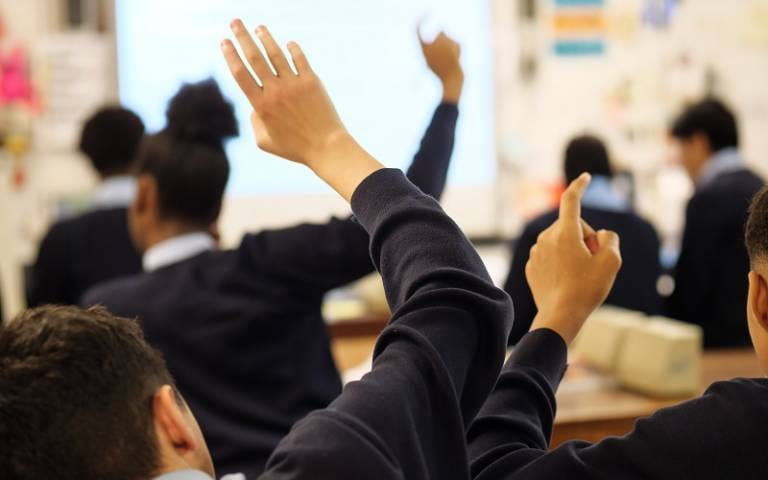Year 6’s: ‘ready, strong and brave’ for the transition to secondary in the time of Covid
By Blog Editor, IOE Digital, on 2 June 2021
 Katya Saville and Sandra Leaton Gray.
Katya Saville and Sandra Leaton Gray.
Since the second lockdown lifted in March and all students were able to return to school, much attention has been placed on the need for schools to help students ‘catch up’ on lost learning. However, our research this year found that the pandemic’s impact on the learning of students in England who were moving from primary to secondary school (Year 7) varied widely.
While many teachers in our study reported that a reasonable degree of learning continued during the first lockdown, almost a third found a wide variation between students. For instance, in interview, one teacher contrasted the difficulties for students in large families with little technological access with the accelerated learning which occurred for other vulnerable students who were able to access in-school provision.
One of our key recommendations, therefore, is to invest heavily in technological infrastructure and training, particularly as our survey findings indicate that, even between lockdowns, schools are now providing much more learning online. Most schools in our survey also relied heavily on websites, videos and learning platforms to facilitate the transition process to secondary school.
Some students revelled in the freedom provided by the first lockdown to pursue projects and their own learning interests, leading to greater autonomy. However, one teacher noted that this freedom didn’t suit everyone: “My two brightest children didn’t perform particularly well. It was almost as though they missed the stimulus of other children around them, and so they were bored by home learning”. We are also aware that the students in our study were, inevitably, those with better access to technology and broadband.
Once back at school in Year 7, many, though not all, students reported that they felt well-prepared by their primary schools for life at secondary. They had not only provided them with information and opportunities to research their new schools but had also set them increasingly challenging classwork and homework. In fact, some felt that Year 7 was not as challenging as they had expected and were somewhat disappointed. Therefore, our data does not indicate dramatic learning loss in this cohort. However, there is evidence of a narrower curriculum offer this year, as many teachers reported limitations to practical activities in science, art and PE and fewer extracurricular clubs and school trips.
What is striking in our data is the flexibility and hard work of schools and remarkable stoicism of students. Schools adapted rapidly to the new situation last year, with many providing food packs, parent support and even trips to bring yearbooks and graduation T-shirts to Year 6 leavers’ homes. The teachers in our survey reported a huge leap in their confidence in working online in just a few months. Many students recognised and appreciated these efforts and, although they felt the loss of many of the end-of-year rituals in Year 6, there was acceptance of the need for many of the restrictions imposed. As one student noted:
I honestly think that this has made us even more united because all of us are going through hard times, all of us may be upset, and that is good because then, we can all help each other to make ourselves happy, to think positive and to have fun! Many things have changed, like when …. We couldn’t have a school trip, all school trips were cancelled, we need to wear masks in corridors, we need to sanitise all the time, which is a bit annoying, but we all need to carry on like this for a while to combat Coronavirus and Year 6s need to be ready, strong and brave for the transition next year.
One of the main reasons for our study, as expressed in our previous blog, was the particular vulnerability of transitioning secondary children who are at the cusp of adolescence. Existing research on school transitions highlights that a child’s background, particularly peer and family relationships, has a key influence on students’ wellbeing and learning progression in secondary school. We recognise the limitations of our student sample, but it is worth noting that the impact of Covid-19 on many students is complicated and, for those moving up to secondary school, perhaps the fears of mass disruption to learning and wellbeing have not been realised.
Media interest in our latest report has focused on our other key recommendation that the ‘bubbles’ experienced in Year 7 this year may actually have protected these students and sheltered them during their transition. However, this too is complicated: once in Year 7, students often mentioned missing different facilities, or contact with older students. As one noted, “Something that has surprised me is that I thought we would have a lot more freedom, but we still have to line up at the end of the day”. In our final phase of data collection, therefore, we want to hear even more from students themselves.
If you know a Year 7 child who would like to share their views, our final student survey is now open.
We are also inviting Year 6 and 7 teachers to interview here.
The IOE is organising a Coffee Break on primary/secondary transition in the time of Covid on Thursday June 17. Sign up here.
 Close
Close



